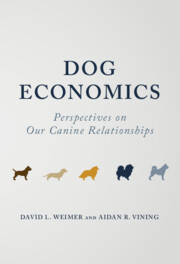Book contents
2 - Chasing the Tale
Origins of the Human–Dog Relationship
Published online by Cambridge University Press: 11 January 2024
Summary
In Chapter 2, we first review the evolution of wolves into dogs and consider the economic concepts and models that help us understand how and why symbiosis between humans and dogs developed and the biological and socio-cultural forces that sustain symbiosis. These questions are the prelude to the economics of dogs in contemporary life. We use the Prisoner’s Dilemma game to illustrate how individuals seeking to maximize their own payoffs can lead to social inefficiency. In this game, the human “Clan” and the wolf “Pack” interact. However, interspecies interaction requires evolutionary game theory, where some wolves have a genetic trait that predisposes them to share with humans. The Hawk-Dove game features equilibria that can result in diverse genetic strategies. Experiments with captive foxes that have little associative behavior with humans show that greater cooperation with humans can be induced quickly through selective breeding. We then build on these concepts and games to introduce the economics of dog co-production with humans. We show how this generates incentives for humans to create distinct types of dogs, or breeds.
Keywords
- Type
- Chapter
- Information
- Dog EconomicsPerspectives on Our Canine Relationships, pp. 13 - 34Publisher: Cambridge University PressPrint publication year: 2024



